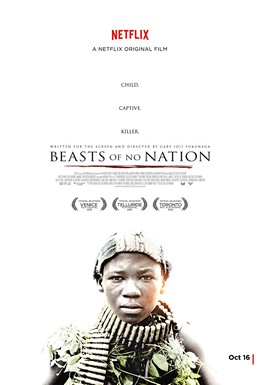Beasts of No Nation marks a historic time in film. Whether that is for better or worse, only time will tell. Instant streaming has been around for some time now, but Beasts of No Nation is a special type of beast because it is Netflix’s first original film. Instead of embracing this, all major theater chains opted to boycott the film, presumably digging their own graves. So, without having to make a one-time, overpriced transaction to see the movie and without having to leave the comfort of my room, I watched Beasts of No Nation.
The film chronicles the tragic journey of a young child, Agu, living in a nameless nation ravaged by war. When war comes to his neighborhood, his family tries to escape, but it’s too little too late and Agu is swept up in the chaos and recruited for war.
Beasts is extremely graphic and merciless in what it shows. Not only is Agu denied a choice in witnessing executions, but he is also forced to participate in them. Just as innocence and joy are bled dry from Agu, they are similarly deprived from the viewer while watching the film. The only difference between this and an exploitation film is that Beasts is not gratuitous for the sake of it. It shows a form of life that is very real for some people. Beasts is an emotional and visual assault and it’s not easy to take.
Idris Elba plays the Commandant, a soldier who not only fights the war, but enjoys it. He takes great pride in his unit and in his leadership and it’s frightening. Elba demonstrates masterful range without chewing the scenery. Credit is definitely due to the writing of this complex commander, but Elba makes his insanity plausible and not just a showpiece.
Cary Joji Fukunaga not only wrote and directed, but also shot the film and the cinematography is probably its strongest dimension. Beasts might be tough to stomach, but it’s also beautiful, a welcoming dichotomy in an otherwise gloom-and-doom world. The colors pop, the camera moves about seamlessly, sometimes without cutting for three or four minutes, and the framing only draws attention to itself on the rarest of occasions. In one particular shot, a drip of water on a table expands as gravity tries to pull it down, sizing up the frame and giving us the visual information we need to tell us where we are in this particular room. Interesting choices like these are only made by a masterful eye. On all fronts, Fukunaga does an excellent job.
However, this great film is punctuated by several damaging flaws. For one, its 137-minute run time feels closer to three hours. There is no way its script was longer than 90 pages, yet the film seems to stretch itself out. Halfway through the film, you’re more than numb from the senseless violence; you’re indifferent. It doesn’t gain steam again until the final 15 minutes, so about a half-hour could have been cut from the movie without impacting the story and the pacing would have felt a lot smoother. And, though the political turmoil is really only a vehicle for Agu’s story, it is extremely unclear who is fighting whom. The film’s conflict doesn’t need to be steeped in political commentary, it just needs clarity.
About halfway through the film, I turned on the subtitles. The luxury of the home-viewing experience is something that movie theaters currently can’t compete with. If I hadn’t been able to turn on subtitles, I might have missed some critical dialogue. If I hadn’t been able to pause it to use the bathroom, I might have missed an important scene. Movie theaters choosing to pass on the film simply because the filmmakers wanted to release it on the big screen and Netflix at the same time makes the movie theater chains feel like the ‘cool kid’ on the block who never leaves his hometown: irrelevant, pathetic and soon to be forgotten while the rest of the world progresses on. Why bother with the movies if they don’t put in an effort to enhance the movie-going experience?

Idris Elba plays the major antagonist in Netflix’s first original movie, Beasts of No Nation.
Photo courtesy of UK Department for International Development (Flickr)
Of course, I am playing the devil’s advocate, because, to me, nothing beats the lights dimming down, the loud speakers blasting and seeing everything unfold on a giant screen. That’s something that’s missed on Beasts. Sure, the cinematography was great, but wouldn’t it be enveloping in a theater? Wouldn’t the soundscape be so much more exhilarating in surround sound, in a room equipped to handle it?
As a movie, Beasts of No Nation is moving, numbing, then moving again. As an experience, it certainly caters to my individual needs, but it takes away all the magic and the escape. I’m still in my room with all the responsibilities of the world surrounding me. It’s a shame that the big chains turned this one down, because it is a great film, even with its setbacks. So I can’t tell you to see this one on the big screen, but I can tell you to open up a new tab or turn on your console, go to Netflix and watch. It might be difficult to digest, especially for the squeamish, but it’s worth your time. That’s the respect all great films deserve, no matter the medium of viewing.



